How Good Sleep Can Protect Your Body and Mind
When we think about health, most of us focus on diet and exercise. But there is another powerful pillar of well-being that people often ignore—sleep. Just like food and movement, sleep is essential for the body and mind to recover and perform at their best. Without enough quality sleep, even the healthiest diet and strictest workout routine will not work as they should.
Good sleep is more than just “rest.” It repairs tissues, strengthens memory, balances hormones, and prepares us for the next day. On the other hand, poor sleep has both short-term and long-term effects that can harm health in ways many don’t realize.
Short-Term Effects of Poor Sleep
When someone sleeps poorly, the results are visible immediately the next day.
Fatigue and Low Energy
Lack of sleep drains the body of energy. Even simple tasks like climbing stairs, attending meetings, or concentrating on studies feel harder.
Example: A college student who stays up late before exams may feel too tired to focus properly during the test.
Irritability and Mood Swings
Poor sleep makes people more emotional, impatient, and quick to anger. The brain struggles to control mood when it hasn’t rested enough.
Example: Parents who don’t sleep well because of a newborn often feel more stressed and short-tempered.
Poor Focus and Memory
Sleep is important for the brain to store and organize memories. Without enough rest, decision-making, creativity, and problem-solving become weaker.
Example: An office worker who sleeps only 4–5 hours may find it difficult to remember details from meetings or finish complex projects on time.
Long-Term Risks of Poor Sleep
Occasional late nights are not harmful, but when poor sleep becomes a habit, the risks grow serious.
Heart Disease
Long-term lack of sleep raises blood pressure and stresses the heart. Over time, this can lead to heart attacks or strokes.
Fact explained simply: During sleep, the heart gets a break. Without this rest, it is forced to work harder for too long.
Diabetes
Poor sleep affects how the body uses sugar for energy. This increases the risk of type 2 diabetes.
Example: People who sleep less than 6 hours regularly are more likely to develop blood sugar problems compared to those who sleep 7–8 hours.
Mental Decline
Sleep helps clear toxins from the brain. Without enough rest, these toxins build up, which can increase the risk of memory loss and conditions like Alzheimer’s disease in older age.
Example: Research shows that older adults with long-term sleep problems are more likely to face dementia.
Weak Immune System
When sleep is poor, the body struggles to fight off infections. People become more likely to catch colds, flu, and other illnesses.
How to Build Healthy Sleep Habits
The good news is that sleep can be improved with simple lifestyle changes.
Follow a Sleep Schedule
Going to bed and waking up at the same time every day helps set the body’s internal clock. This makes it easier to fall asleep naturally.
Avoid Screens Before Bed
Phones, TVs, and laptops give off blue light, which tricks the brain into thinking it’s still daytime. Avoiding screens an hour before bed helps the body release melatonin, the “sleep hormone.”
Create a Relaxing Routine
Reading a book, doing light stretching, or practicing deep breathing signals the body that it’s time to rest.
Example: People who drink herbal tea or listen to soft music before bed often fall asleep faster.
Keep the Bedroom Sleep-Friendly
A cool, dark, and quiet room is best for quality sleep. A comfortable mattress and pillow also make a big difference.
Role of Diet and Exercise in Sleep Quality
What we eat and how active we are also affect sleep.
Diet and Sleep
-
Heavy meals before bed can disturb rest.
-
Caffeine and energy drinks in the evening can keep the brain awake.
-
Foods rich in magnesium (like almonds, spinach) and tryptophan (like turkey, milk) help calm the body for better sleep.
Example: A person who skips coffee after 4 PM often notices deeper and longer sleep.
Exercise and Sleep
Regular physical activity improves sleep by reducing stress and relaxing the body. However, very intense workouts right before bed may have the opposite effect.
Example: Someone who takes a 20-minute evening walk usually sleeps better than someone who spends the evening sitting in front of a screen.
Conclusion
Sleep is not a luxury—it is a necessity. Good sleep protects the heart, keeps blood sugar stable, sharpens memory, strengthens the immune system, and balances mood. Poor sleep, especially over the long term, can increase the risk of heart disease, diabetes, and mental decline.
To live a healthy life, it is important to treat sleep with the same respect we give to diet and exercise. With small changes like following a sleep schedule, limiting screen time, eating the right foods, and staying active, anyone can improve their sleep and, in turn, their long-term health.
FAQs
Q1: How many hours of sleep do adults need?
Most adults need 7–9 hours of sleep every night for good health.
Q2: Can naps replace poor night sleep?
Short naps can boost energy but cannot replace full night sleep. Deep rest only comes from longer sleep cycles.
Q3: What foods can help improve sleep?
Almonds, bananas, warm milk, and herbal teas like chamomile are known to promote better sleep.
Q4: Is it bad to use phones in bed?
Yes, the blue light from phones delays sleep by stopping melatonin production.
Q5: Does exercise really help sleep?
Yes, regular light to moderate exercise helps the body relax and improves sleep quality.


